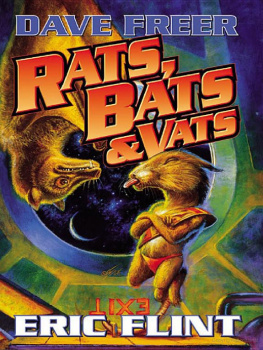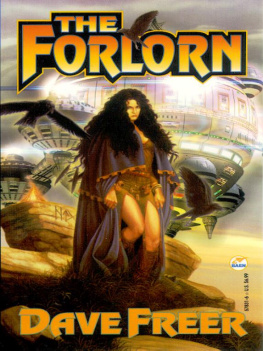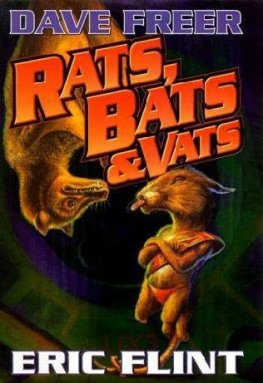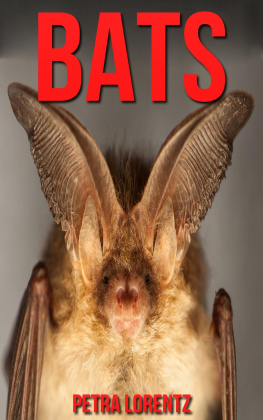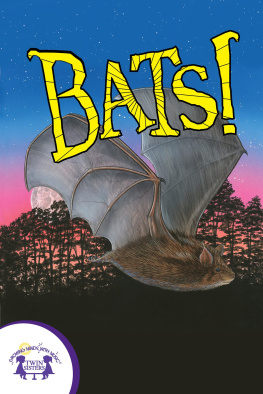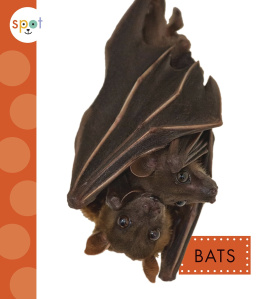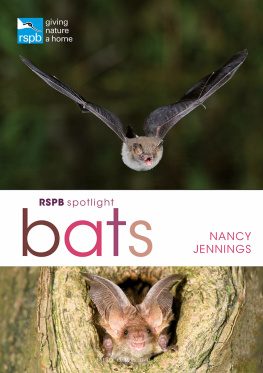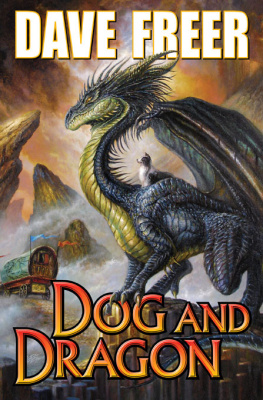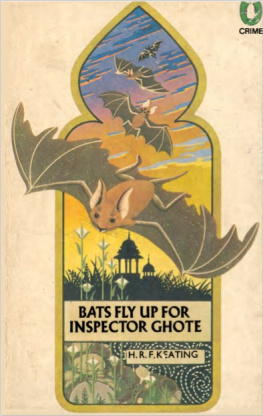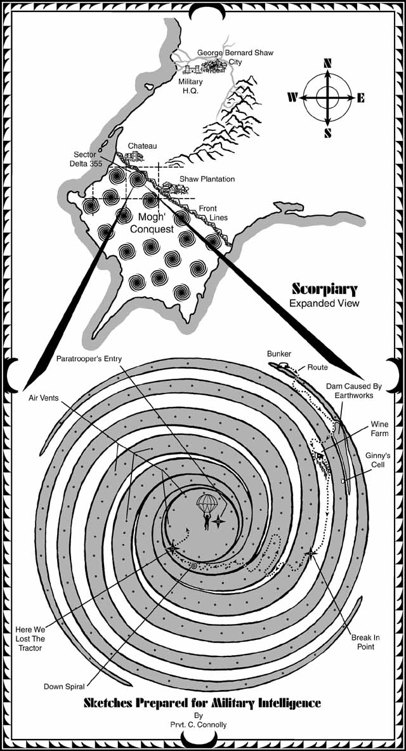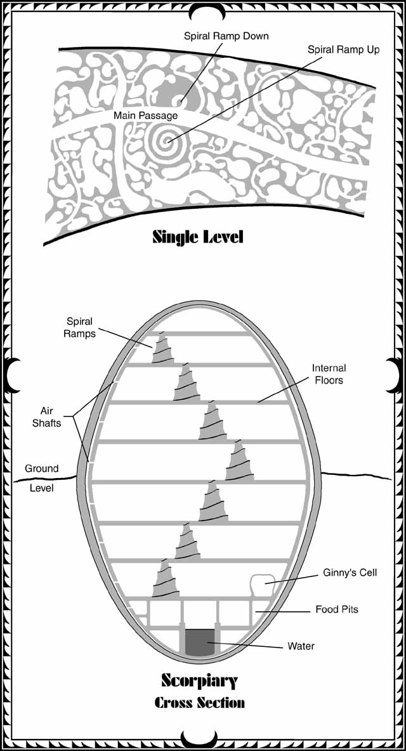Rats, Bats and Vats
by Dave Freer and Eric Flint
This is a work of fiction. All the characters and events portrayed in this book are fictional, and any resemblance to real people or incidents is purely coincidental.
Copyright 2000 by Dave Freer & Eric Flint
All rights reserved, including the right to reproduce this book or portions thereof in any form.
A Baen Books Original
Baen Publishing Enterprises
P.O. Box 1403
Riverdale, NY 10471
www.baen.com
ISBN: 0-671-31940-X
Cover art by Bob Eggleton
Interior maps by Randy Asplund
First printing, September 2000
Library of Congress Cataloging-in-Publication Data
Freer, Dave.
Rats, bats & vats / by Dave Freer & Eric Flint.
p. cm.
ISBN 0-671-31940-X
1. Human-animal relationshipsFiction. 2. RevolutionariesFiction.
I. Title: Rats, bats, and vats. II. Flint, Eric. III. Title.
PS3556.R3935 R37 2000
813'.54dc21 00-040370
Distributed by Simon & Schuster
1230 Avenue of the Americas
New York, NY 10020
Production by Windhaven Press, Auburn, NH
Printed in the United States of America
To the world's grunts
Also by Dave Freer:
The Forlorn
Also by Eric Flint:
Mother of Demons
1632
The Belisarius series, with David Drake:
An Oblique Approach
In the Heart of Darkness
Destiny's Shield
Fortune's Stroke
The Federation of the Hub series,
by James H. Schmitz
edited by Eric Flint:
Telzey Amberdon
T'NT: Telzey & Trigger
Trigger & Friends
(forthcoming)
Acknowledgments
by Dave Freer
This book owes a great deal to the advice of several people: Conrad Chu, for his tolerant explanations of technical aspects, our fellow author John Ringo for his input on military matters, and Aubrey Rautenbach for his patient advice on tractors and cropsprayers. I must also thank my longsuffering biologist/scientist peers, Drs. Ware, Wolber, Baker, Collins and Hawkes, for their help in solving the biological conundrums involved in building alien biosystems. Any errors are ours, not theirs. In addition to this, many of the great crowd at Baen's Bar (http://www.baen.com) helped with suggestions and snippets of information.
Two other people need especial thanks: my wife Barbara, and Kathy Holton, my proofreader. Between the two of them they turn my English into something readable, before I turn my pages over to Eric. Barbs also exercises enormous restraint and tolerance with a husband who lives in an alien world half the time.
Finally, I'd like to thank my friend and writing mentor, Eric (the Bear) Flint. Countless e-mail discussions, the chapters being passed to-and-fro, and not a few international calls, made this bookand also made it great fun to write. The constant sparking off each other produced a book I could never have written alone.
Dave Freer
Eshowe
KwaZulu-Natal
South Africa
November 11, 1999
Dramatis Personae
Hominidae
Chip, A Vat-grown conscript. A thing of rags and tatters.
Ginny, A damsel of high degree; and a secret.
Fitzhugh, The very model of a modern major.
Rattae
Fal, Great of appetite. Small of martial rigor.
Doll, A rattess of negotiable virtue.
Phylla, A rattess. Though cattish of tongue.
Melene, A rat-damsel of acumen, and a very attractive tail.
Pistol, A rat-at-arms. One-eyed.
Nym, A giant among rats; and mechanically bent.
"Doc," A ratly philosopher and medic.
Ariel, A rattess of fell repute. Fond of model majors.
Battae
Bronstein, She-bat who must be obeyed.
Siobhan, A fussy mother-bat.
O'Niel, A plump bat; but a true soul.
Behan, A loyal batty.
Eamon, A large and dangerous bat. And disgruntled.
Et Alia
Prof, Tutor to Ginny; remarkably like a sea urchin.
Fluff, A galago, confused with Don Quixote.
And a supporting cast of: one Jampad, various stalwarts, innumerable fools, and several million villainous Magh'.
Prologue:
A successful experiment.
The Expediter listened in silence. With difficulty, it managed to remain motionless. The Expediter was in the middle of its sex-interphase and the hormonal changes always made it irritable. That irritability interfered with its logical thought processes. The Expediter did not want to act out of simple aggravation.
Should it continue to prevaricate?
Lying was possible, of course, especially to such as these. Primitive creatures, really, the female as much as the male. But the Expediter thought that it would still be very difficult. Any explanation as to why the starship had left so hastily would seem contrivedeven to the two stupid beings who were bombarding the Expediter with their clamor.
The Expediter pondered the matter for some time before coming to its conclusion.
No. Further prevarication would hardly be worth the effort. Besides, the Expediter thought that it was time to discover how well the protease haemato-toxin affected this species.
The dart-spines targeted, ocelli orientating them to center on the soft, bulging midriff-masses. The two beings in the room made no attempt to escape. They simply continued their babble. Apparently, they did not recognize the purpose of the spines. An interesting datum.
Razor-tipped, barbed harpoon-darts streaked out, each trailing their protoplasm hose. The skewering force of the darts cut into the gold head-filamented female in mid-shrill. Her bleat became a scream as the Expediter's internal myomeres pumped the massive dose of digestive-toxin into the soft-bodies.
The creatures threshed. The Expediter studied the ensuing process with interest.
Cell-lysis caused the circulatory fluids to pour out of the eating and scent-detection orifices. The soft, pallid epidermis ulcerated and erupted, spraying liquefied flesh. The bipedal beings were now twisting and writhing in bizarre contortions.
Another interesting datum. The Expediter had not realized that their vertebral columns could bend as far as that. Endoskeletons were strange biological adaptations. It made a note of that flexibility.
The Expediter watched as lysis continued. A full two minutes passed before the bodies finally lay still. Also worth noting. The digestive-toxin was not rapid, but it was effective. That, of course, was to be expected. The Overphyle had yet to discover a sentient species immune to it.
The Expediter disengaged the barbs of its harpoon darts, pulled them out and winched them back into itself. Then, after a moment's hesitation, decided not to feed. It was not particularly hungry, and there was always a slight risk with ingesting untested alien protein.
Multiple ocelli checked the room. Other than the two sprawled, bloody, ruined bodies there were no signs of the Expediter's passage.
Calmly, it left, locking the door behind it. In the silent and luxuriously appointed room, the only trace that remained of the murderer's identity was a faint camphor-naphthalene scent. That would dissipate within a few minutes. The Expediter itself was quite oblivious to the smell, but it hardly mattered. By the time the servants found the bodies, the odor would be indistinguishable from the general reek.

